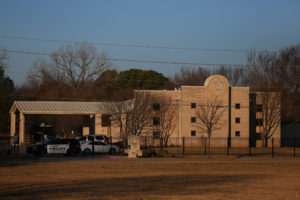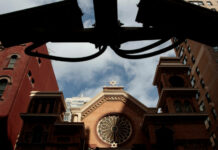
In the days following the Colleyville, Texas, synagogue hostage crisis at Congregation Beth Israel, Lafayette Hill synagogue Congregation Or Ami’s Executive Director Scott Allen was in Zoom meetings about synagogue security all day.
Synagogue administration took stock of the security measures they already had in place — a relationship with the local police department, cameras, alarm systems, security lights — and determined that though their systems could always be improved, what they had in place felt appropriate in case of an attack of Colleyville’s caliber.
“We have a lot of things in place that have been recommended previously, and we got funding from various security grants to enable us to have a robust system that we were pretty happy with,” Allen said.
After the Tree of Life shooting, the Jewish Federation of Greater Philadelphia and the Pennsylvania Jewish Coalition advocated for the creation of a statewide nonprofit grant program for agencies that are victims of hate crimes.
Congregation Or Ami is one of 38 Jewish institutions in the area that received state funding in 2020. Twenty-four local institutions received grants in 2021. The 2022 grant process will open soon, and Jewish Federation has retained a grant writing consultant to advise local agencies applying for these security funds.
The Jewish Federations of North America, which announced a $54 million LiveSecure security grant in October, will expedite the distribution of those funds, beginning next month, as a balm for anxious synagogue leaders in the wake of the Colleyville crisis.
There also are federal nonprofit security grants of at least $180 million going through the federal appropriations process, as well as a new $4.5 million budget allocation from the Pennsylvania Legislature.
As many synagogues across the country, like Or Ami, reconsider or double-down on security precautions in place, others are choosing to forgo security guards and surveillance, examining the meaning of safety in their community.
After Colleyville, Rabbi Ari Lev Fornari of Kol Tzedek synagogue in West Philadelphia wrote in an email, “In this moment of heightened fear, especially in this moment, we recommit to finding a path to personal and collective safety that does not increase the presence of police in our community.”
In the last week of January, Kol Tzedek invited Subduction Consulting, a Portland, Oregon-based nonprofit providing transformative justice and equity training, to host a three-part de-escalation training for community members.
“Even in the best of situations when law enforcement does exactly what they’re supposed to do — and we know they can de-escalate — we know that we are better positioned to de-escalate in our own community,” Kol Tzedek board President Elana Baurer said.
Baurer describes the synagogue as a “multiracial community,” a home to Black Jews and Jews of color, as well as LGBTQ Jews — populations that historically were the victims of police violence. A Nov. 11 Washington Post analysis reported that police fatally shot Black men at twice the rate of white men.
“Many of us don’t feel like police keep our communities safe,” Baurer said.
De-escalation training provides an opportunity for community members to address interpersonal conflicts, often nonviolent in nature and much more frequent than violent, antisemitic attacks, without law enforcement.
“Security training strengthens muscle memory so when faced with an emergency you know what to do,” Jewish Federation President and CEO Michael Balaban said.
Jewish Emergency Preparedness Project CEO Yoni Ari said the organization is working on a yearlong three-part training for Jewish institutions to develop a “culture of preparedness” in times of natural disasters or safety breaches, which includes security training.
In times of conflict, a fight, flight or freeze response is activated in individuals, according to Subduction Consulting founder Theresa Logan. De-escalation training gives individuals tools to distance themselves from an initial response of fear or anger.
“We have the ability to bring some modicum, hopefully, of justice, a little bit of tranquility and a little bit more even-mindedness when conflict does arise,” Subduction Consulting facilitator and partner Carlos Kareem Windham said. “It’s not that conflicts won’t arise — they will. It’s part of life. How we respond to them, though, is the piece that, if we practice it, we work at it, it is something we have a choice in.”
Congregation Beth Israel Rabbi Charlie Cytron-Walker attributes similar de-escalation training to his managing of the hostage crisis.
“As a part of rabbinic training, as a part of training as clergy we talk a lot about the idea of being a calm, non-anxious presence, we do that in hospital rooms; we do that during the most difficult individual moments,” Cytron-Walker said in a Jan. 17 CBS interview.
Cytron-Walker recalled preparing tea for gunman Malik Faisal Akram when he entered the sanctuary, asking him questions and speaking with him at length, de-escalation strategies Windham recommends and that have been successful in the past.
“One of the strategies is just, can you recognize this person’s humanity?,” Subduction Con-
sulting founder Theresa Logan said. “Because if you can see their humanity and understand what is happening for them … Are they trying to get attention? Are they in need of mental health or other kinds of health care? — We can start to identify what strategy might help.”
De-escalation training is not a panacea for security threats, Windham and Logan admit. If one is in immediate danger, one should do whatever they can to protect themselves, including calling law enforcement.
Grant Schmidt, a Jewish armed security guard, is a proponent of synagogues employing more assertive security tactics for this reason.
Security rarely presents or uses a firearm, Schmidt said. He has received de-escalation training and insists that the presence of his firearms is “irrelevant” in conflict situations.
Schmidt, who provides security to synagogues on the Main Line, suggests that arms should always be present at Jewish events.
But Windham argued that if an armed individual approaches a synagogue intending to harm, the presence of an armed guard won’t be able to stop an attack.
“What you really should be there to do is to build community and worship — that’s really the main thing you’re there to do if you’re there for synagogue,” Windham said. “You can’t simultaneously prepare for and prevent war.”
[email protected]; 215-832-0741






